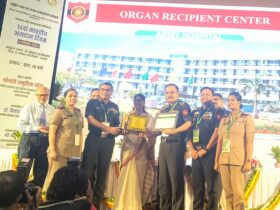KNB News Desk
Srinagar 18 March (KNB): Scientists from Bangalore developed a highly reliable, High Electron Mobility Transistor (HEMTs) that is a normally OFF device and can switch currents up to 4A and operates at 600V.
A statement by Ministry of Science and Technology said that this first-ever indigenous HEMT device made from gallium nitride (GaN) is useful in electric cars, locomotives, power transmission and other areas requiring high voltage and high-frequency switching would reduce the cost of importing such stable and efficient transistors required in power electronics.
“Power electronic systems demand high blocking voltage in OFF-state and high current in ON-state for efficient switching performance. Specific transistors called HEMTs made of aluminium gallium nitride/ gallium nitride (AlGaN/GaN) provides an edge over silicon-based transistors as they allow the systems to operate at very high voltages, switch ON and OFF faster, and occupy less space,” officials stated, adding that commercially available AlGaN/GaN HEMTs use techniques to keep the transistor in normally OFF state, which affects the stability, performance and reliability of the device.
Therefore, to meet this need, Prof. Mayank Shrivastava, Dept. of Electronic Systems Engineering, his co-investigators Prof. G. Narayanan, Prof. Digbijoy Nath, Prof. Srinivasan Raghavan and Prof. Navakanta Bhat, from Department of Electrical Engineering, and Centre for Nanoscience & Engineering, and their students, all from Indian Institute of Science Bangalore (IISc), have developed the new kind of HEMT, which is in the OFF state by default and works like any other commonly used power transistor.
Prof. Mayank Shrivastava told Kashmir News Bureau that the team has been working on the project for 8-9 years.
“Gallium nitride has already emerged as the key technology. It (GeN) has the potential to replace the silicon based power devices,” the Professor said, adding that majority of 18 Billion $ power device market is captured by silicon based power devices and it is possible that GeN HEMTs will replace a larger portion of it.
“It is the reason that there is a worldwide race to develop GeN based technology,” said Prof. Mayank Shrivastava, adding that India by large is doing pretty well in GeN related research.
He further thanked the Government’s pro-active Initiates taken 10 years ago and fundings due to which the Gallium Nitride related projects picked up well through out the country.
“If we as a country want to lead in any sector, Government must set up similar examples and start funding futuristic projects,” he said, adding that, “then only what seems to be futuristic today will become reality tomorrow.”
Moreover, the official statement said that such transistors are called e-mode or enhancement mode transistors.
“Supported by the Department of Science & Technology (DST), Government of India, under the ‘Make in India’ initiative, they developed the new technology and device architecture using an Aluminium titanium oxide gate,” they added.
The developed technology is a first of its kind, which uses a type of chemical called ternary oxide (composed of two different metal ions combined in an oxide matrix or Al, Ti and O), which behaves like material having larger positive charge concentration (p-type material).
“It does away with intrinsic reliability and performance issues of the in-use industrial techniques for e-mode HEMTs, allowing the development of efficient power switching systems,” officials stated.
They informed that this device will now be taken up for the prototype development and field-testing level (TRL 5).
“The scientists used aluminium titanium oxide as the gate oxide, where the percentage of aluminium could be controlled during the fabrication process,” officials stated, adding that since aluminium titanium oxide is stable, it resulted in high reliability of the transistor.
As per the statement, The projected overall power device market is set to cross the 18 Billion $ mark by 2020, out of which the market for HEMTs is projected to cross the 5 Billion US$ market.
“So, GaN HEMTs will acquire a major share of the power device market. With a growing market for electric vehicles in India, such an indigenous development can make India self-reliant for transistor technology,” officials stated. (KNB)

















Leave a Reply